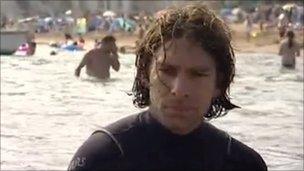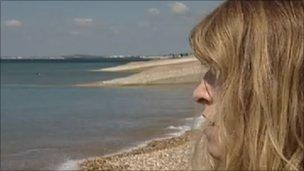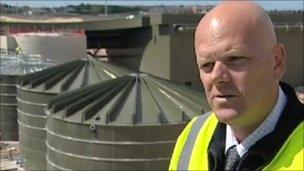Sewage fear for losing Blue Flag beaches
- Published

Andy Cummins said Surfers Against Sewage found it difficult to get information about discharges
Raw sewage flowing into the sea after heavy rain may have contributed to a drop in water quality on beaches in the South East, bosses have admitted.
Eight beaches in Kent and Sussex lost their Blue Flag status in May, which users claim is partly due to discharge from combined sewage overflows (CSOs).
Surfers Against Sewage said it was difficult to get information about how much raw sewage was being discharged.
Southern Water admitted CSOs "probably" had an effect on sea water quality.
The company is responsible for treating waste water in Kent, Sussex, Hampshire and the Isle of Wight.
Most sewage goes to treatment works but during periods of heavy rain CSOs are used to relieve pressure on the system.
Southern Water has 751 CSOs discharging into rivers and the sea.
The pipes combine untreated raw sewage with other domestic waste water and run-off from roads, paved areas and roofs.

Joanne Shelsher said she believed raw sewage in the sea at Hove had made her ill
The company was unable to tell BBC South East how much sewage was being released into the sea because it monitors only about one third of its CSOs.
Of the 47 designated bathing beaches in Kent and East Sussex, 40 are said by the Environment Agency to be at potential risk from CSO discharges.
Andy Cummins, spokesman for Surfers Against Sewage, said there was no political will to make water companies share information about the discharge of raw sewage.
"There are CSOs all round the UK discharging raw sewage all year for hours on end and the public deserve to be told," he said.
"We have groups of surfers all coming down with the same illness and the only link they've really got is using the same body of water."
Joanne Shelsher believes she contracted an ear infection from swimming in the sea at Hove.
She said tests done by her doctor showed the infection came from human faeces.
"Last year, the last time I went in, it had been raining and it was quite choppy," she said.
"Friends who I swim with all had burning throats and felt physically sick.
"That's when I knew there was raw sewage in there."
Hove Lawns and West Street beaches in Brighton are among those which lost their Blue Flags this year.
Brighton has two unmonitored CSOs.

Geoff Loader said Southern Water was running a trial to give sewage information for ten beaches
Southern Water director Geoff Loader said £150m had been spent on improving CSOs in the last three years.
He said it was estimated that about 5% of material discharged from CSOs was untreated human sewage.
But he admitted CSOs would probably have had an effect on the drop in water quality on beaches last year.
"They have to, yes definitely there's going to be an effect," he said.
The Marine Conservation Society believes CSOs are a major contributing factor to water quality.
"We need to know where all these CSOs are, we need them mapped, we need them monitored and then we need to work out what the environmental impact of them is," said spokesman Dr Robert Keirle.
Southern Water said it had been running a trial with Surfers Against Sewage to give sewage alerts at 10 beaches in its area.
- Published10 May 2011